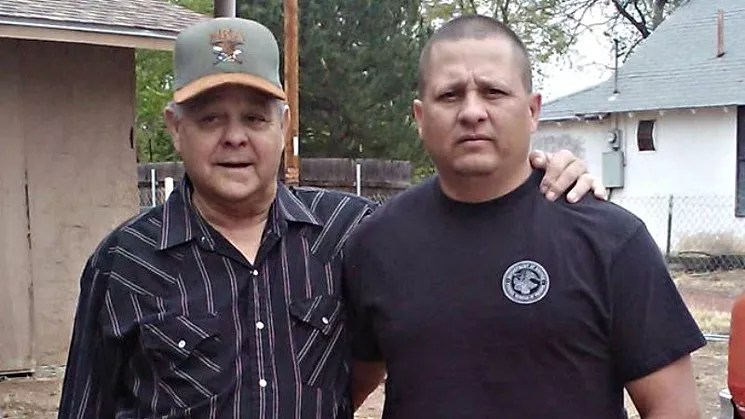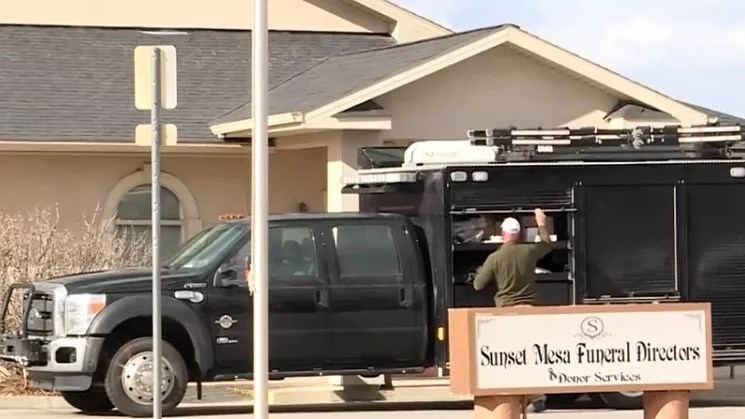
Courtesy of Bobby Espinoza

Audio By Carbonatix
These days, most of the actions being taken by Governor Jared Polis pertain to COVID-19. But on April 1, he found time to sign House Bill 20-1148, which makes practices of the sort allegedly conducted by Montrose’s Megan Hess – authorities believe that she chopped up the bodies of deceased individuals and sold select parts at her funeral home, Sunset Mesa, without the knowledge or consent of family members – a Class 6 felony.
The new law won’t affect the prosecution of Hess and her mother, Shirley Koch, who were indicted last month by a grand jury after an investigation that lasted over two years. Instead, the pair face six counts of mail fraud and three illegal-transportation-of-hazardous-materials charges – the most serious options available, since Colorado statutes didn’t directly address a business model that caused heartaches for countless loved ones.
Take Bobby Espinoza, who told us in 2018 about the trauma that he and other relatives suffered after finding out that the body of his late father, Jerry Espinoza Sr., who’d been assigned to Sunset Mesa for care, had been dismembered and peddled for parts; Jerry’s head and legs were carved from his body and his torso and pelvis severed prior to their distribution to three different purchasers.
A steady stream of horror stories like these have flowed from Sunset Mesa ever since the FBI raided the facility in February 2018 – and such cases aren’t unique. Westword obtained a human body parts price list from Biological Resource Center Inc., a now-defunct Arizona business that charged $200 for an elbow, $400 for a whole arm and shoulder, $3,300 for a torso with attached head (referred to as a “cephalus”) and $5,000 for an intact corpse.

An investigator outside Sunset Mesa funeral home in Montrose.
CBS4 via YouTube
Denver-based Burg Simpson eventually won a lawsuit against BRC for more than $58 million – and Michael Burg, one of the firm’s namesakes, contends that what took place at Sunset Mesa was even worse. He’s handling two civil cases filed against Sunset Mesa on behalf of more than seventy plaintiffs, including Bobby Espinoza. Durango’s Chris Cowan of Downs, McDonough & Cowan, LLC, has filed a separate complaint based on the experiences of clients such as Terri Thorsby, who was stunned when the feds revealed that her late mother, Mildred Carl, had been dismembered and the separate parts sold: Carl’s head was shipped to one business, her arms, feet, knees and pelvis to another.
Representative Matt Soper, a Republican from the Western Slope, was appalled by such tales, as well as frustrated to learn that Colorado lacked the legal mechanisms to truly address the situation. So he came up with the idea of upgrading the state’s abuse-of-a-corpse offense from a misdemeanor to a felony. “Whether it’s organized, like what Megan Hess was doing, or it was a one-off crime, abusing a corpse shouldn’t be a misdemeanor-level offense,” he told us in January. “It’s just an egregious act.”
Before long, Soper had lined up some high-profile sponsors, including Democratic Senator Rhonda Fields. At the time of the bill’s introduction, he was feeling confident: “I’m not sensing a partisan fight here at all. … I have a sense it will have bipartisan support, since this is such a horrible act.”
He was right. The measure sailed through both the Colorado House and Senate, landing on Polis’s desk during the weeks before the novel coronavirus short-circuited the 2020 session, and pretty much every other part of society in Colorado. That Polis found time amid the current crisis to ink the legislation speaks volumes.
Click to read the final version of House Bill 20-1148.